泼水节英文介绍 PPT
- 格式:ppt
- 大小:10.79 MB
- 文档页数:11
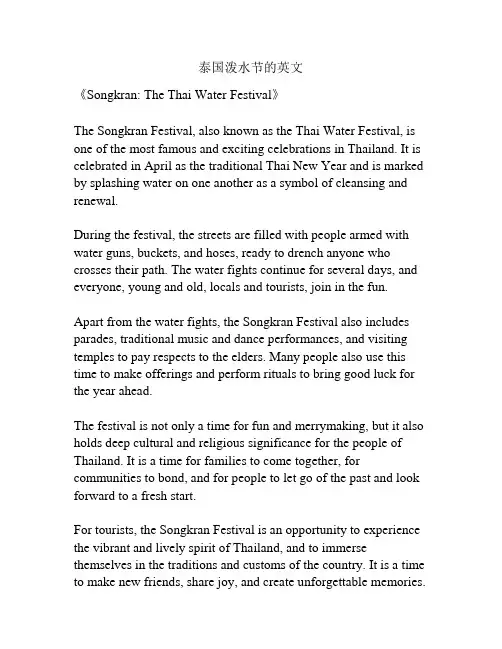
泰国泼水节的英文《Songkran: The Thai Water Festival》The Songkran Festival, also known as the Thai Water Festival, is one of the most famous and exciting celebrations in Thailand. It is celebrated in April as the traditional Thai New Year and is marked by splashing water on one another as a symbol of cleansing and renewal.During the festival, the streets are filled with people armed with water guns, buckets, and hoses, ready to drench anyone who crosses their path. The water fights continue for several days, and everyone, young and old, locals and tourists, join in the fun.Apart from the water fights, the Songkran Festival also includes parades, traditional music and dance performances, and visiting temples to pay respects to the elders. Many people also use this time to make offerings and perform rituals to bring good luck for the year ahead.The festival is not only a time for fun and merrymaking, but it also holds deep cultural and religious significance for the people of Thailand. It is a time for families to come together, for communities to bond, and for people to let go of the past and look forward to a fresh start.For tourists, the Songkran Festival is an opportunity to experience the vibrant and lively spirit of Thailand, and to immerse themselves in the traditions and customs of the country. It is a time to make new friends, share joy, and create unforgettable memories.In conclusion, the Songkran Festival, also known as the Thai Water Festival, is a celebration of joy, renewal, and togetherness. It is a time when people come together to embrace the new year and wash away the past. It is truly a unique and exhilarating experience that should not be missed.。
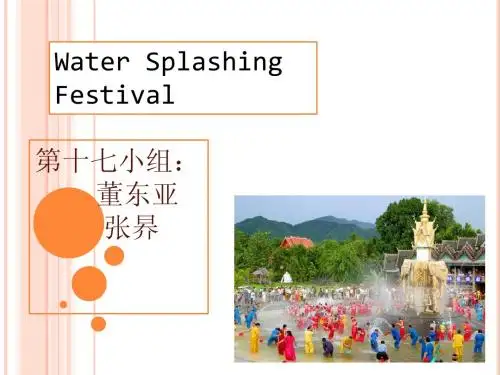
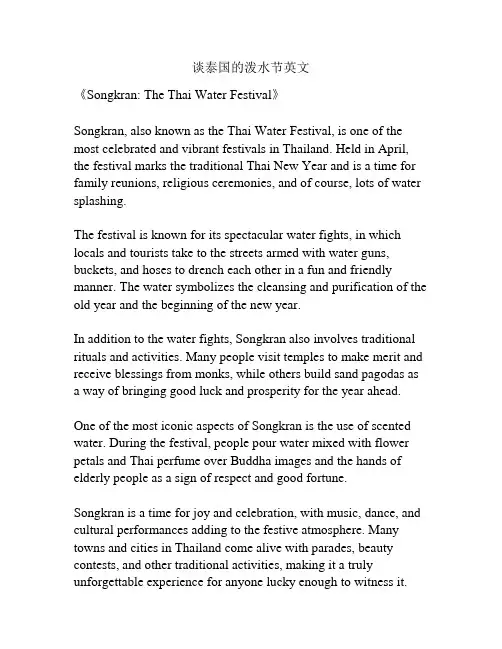
谈泰国的泼水节英文《Songkran: The Thai Water Festival》Songkran, also known as the Thai Water Festival, is one of the most celebrated and vibrant festivals in Thailand. Held in April, the festival marks the traditional Thai New Year and is a time for family reunions, religious ceremonies, and of course, lots of water splashing.The festival is known for its spectacular water fights, in which locals and tourists take to the streets armed with water guns, buckets, and hoses to drench each other in a fun and friendly manner. The water symbolizes the cleansing and purification of the old year and the beginning of the new year.In addition to the water fights, Songkran also involves traditional rituals and activities. Many people visit temples to make merit and receive blessings from monks, while others build sand pagodas as a way of bringing good luck and prosperity for the year ahead.One of the most iconic aspects of Songkran is the use of scented water. During the festival, people pour water mixed with flower petals and Thai perfume over Buddha images and the hands of elderly people as a sign of respect and good fortune.Songkran is a time for joy and celebration, with music, dance, and cultural performances adding to the festive atmosphere. Many towns and cities in Thailand come alive with parades, beauty contests, and other traditional activities, making it a truly unforgettable experience for anyone lucky enough to witness it.The Thai Water Festival is not just a fun and lively event, but also holds deep cultural and religious significance for the Thai people. It is a time to honor tradition, connect with family and friends, and welcome the new year with joy and positivity. If you ever find yourself in Thailand during Songkran, be prepared to get wet, have fun, and create lasting memories of this incredible festival.。
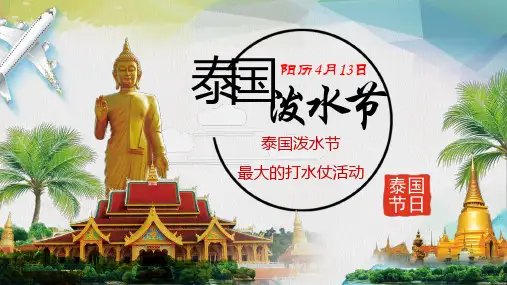
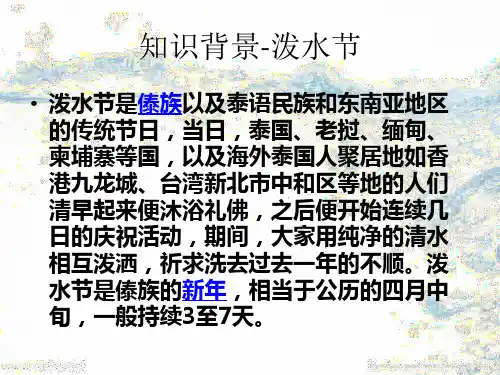
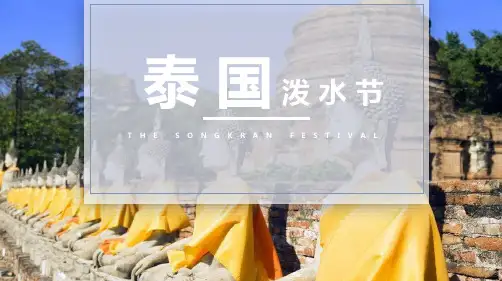
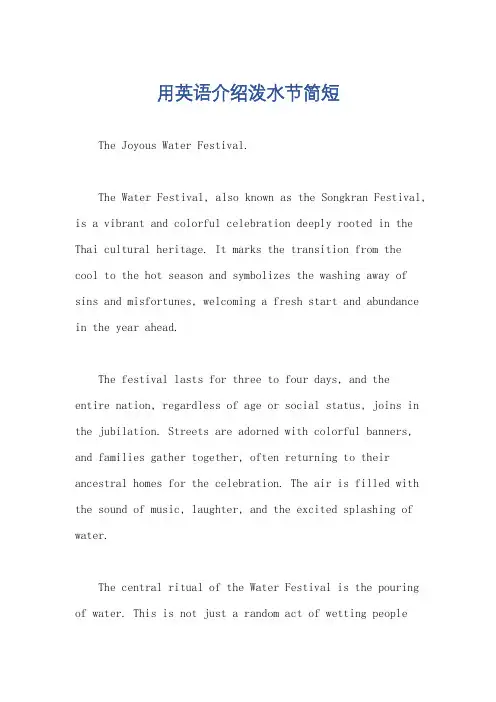
用英语介绍泼水节简短The Joyous Water Festival.The Water Festival, also known as the Songkran Festival, is a vibrant and colorful celebration deeply rooted in the Thai cultural heritage. It marks the transition from the cool to the hot season and symbolizes the washing away of sins and misfortunes, welcoming a fresh start and abundance in the year ahead.The festival lasts for three to four days, and theentire nation, regardless of age or social status, joins in the jubilation. Streets are adorned with colorful banners, and families gather together, often returning to their ancestral homes for the celebration. The air is filled with the sound of music, laughter, and the excited splashing of water.The central ritual of the Water Festival is the pouring of water. This is not just a random act of wetting peoplebut a symbolic gesture of purification and good wishes. People carry buckets, hoses, and even water cannons to pour water over each other, often singing and dancing merrily. This act symbolizes the washing away of bad luck, sins, and impurities, leaving one refreshed and ready to embrace the new year.The festival is not just about water play, though. It's also a time for community gatherings, cultural performances, and feasting. Temples are particularly busy as people visit them to pray and offer alms to monks. These almsgiving ceremonies are an integral part of the Buddhist faith and are deeply respected by Thais.The Water Festival is also a showcase of Thai culture and tradition. Traditional costumes, known as "sinh", are worn, and vibrant folk dances are performed. These dances, often telling stories of Thai mythology or history, are a treat to watch and help preserve the rich cultural heritage of Thailand.Food is another highlight of the festival. Streetvendors set up stalls offering a variety of delicious Thai dishes, from spicy curries to sweet desserts. These foods are shared among friends and family, creating strong bonds and memories that last a lifetime.The Water Festival is not just a time for fun and games, though. It's also a time for reflection and giving. Many people take this opportunity to donate to charity, helping those less fortunate. This act of kindness is seen as a way to accumulate merit and ensure a prosperous year ahead.The Water Festival truly is a festival of joy, unity, and purification. It's a time for Thais to come together, forget their differences, and celebrate their rich cultural heritage. It's a festival that not only brings joy to the people of Thailand but also attracts tourists from all over the world, who come to experience the unique culture and spirit of the Water Festival.In conclusion, the Water Festival is much more thanjust a celebration of the changing of the seasons. It's a celebration of life, community, and the rich culturalheritage of Thailand. It's a time for joy, giving, and reflection, and it truly embodies the spirit of unity and brotherhood that is so deeply ingrained in Thai culture.。
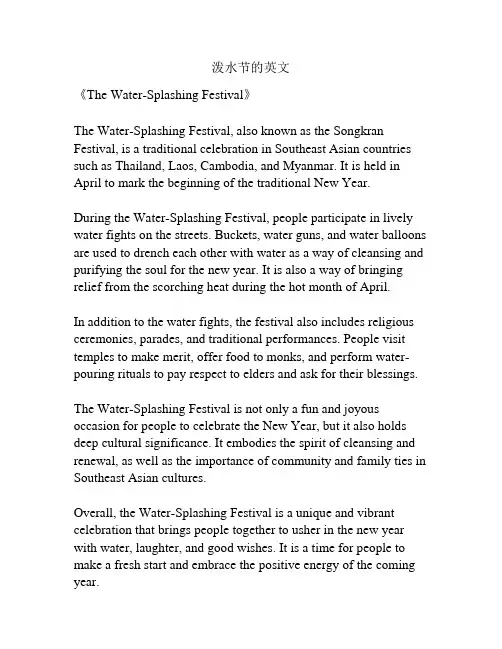
泼水节的英文《The Water-Splashing Festival》The Water-Splashing Festival, also known as the Songkran Festival, is a traditional celebration in Southeast Asian countries such as Thailand, Laos, Cambodia, and Myanmar. It is held in April to mark the beginning of the traditional New Year.During the Water-Splashing Festival, people participate in lively water fights on the streets. Buckets, water guns, and water balloons are used to drench each other with water as a way of cleansing and purifying the soul for the new year. It is also a way of bringing relief from the scorching heat during the hot month of April.In addition to the water fights, the festival also includes religious ceremonies, parades, and traditional performances. People visit temples to make merit, offer food to monks, and perform water-pouring rituals to pay respect to elders and ask for their blessings.The Water-Splashing Festival is not only a fun and joyous occasion for people to celebrate the New Year, but it also holds deep cultural significance. It embodies the spirit of cleansing and renewal, as well as the importance of community and family ties in Southeast Asian cultures.Overall, the Water-Splashing Festival is a unique and vibrant celebration that brings people together to usher in the new year with water, laughter, and good wishes. It is a time for people to make a fresh start and embrace the positive energy of the coming year.。
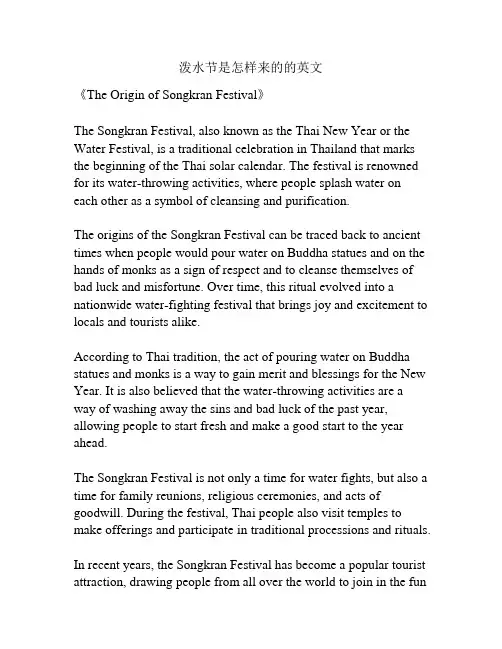
泼水节是怎样来的的英文《The Origin of Songkran Festival》The Songkran Festival, also known as the Thai New Year or the Water Festival, is a traditional celebration in Thailand that marks the beginning of the Thai solar calendar. The festival is renowned for its water-throwing activities, where people splash water on each other as a symbol of cleansing and purification.The origins of the Songkran Festival can be traced back to ancient times when people would pour water on Buddha statues and on the hands of monks as a sign of respect and to cleanse themselves of bad luck and misfortune. Over time, this ritual evolved into a nationwide water-fighting festival that brings joy and excitement to locals and tourists alike.According to Thai tradition, the act of pouring water on Buddha statues and monks is a way to gain merit and blessings for the New Year. It is also believed that the water-throwing activities are a way of washing away the sins and bad luck of the past year, allowing people to start fresh and make a good start to the year ahead.The Songkran Festival is not only a time for water fights, but also a time for family reunions, religious ceremonies, and acts of goodwill. During the festival, Thai people also visit temples to make offerings and participate in traditional processions and rituals. In recent years, the Songkran Festival has become a popular tourist attraction, drawing people from all over the world to join in the funand excitement of the water-throwing activities. Many cities and towns in Thailand hold elaborate celebrations, with parades, street parties, and music performances adding to the festive atmosphere. The Songkran Festival is a time of joy, unity, and spiritual renewal for the Thai people. It is a colorful and vibrant celebration that reflects the rich cultural heritage of Thailand, and it continues to be an important and cherished tradition for generations to come.。
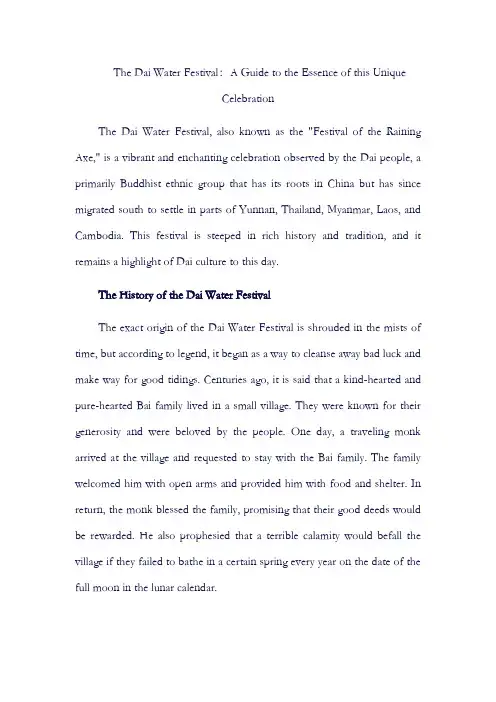
The Dai Water Festival:A Guide to the Essence of this UniqueCelebrationThe Dai Water Festival, also known as the "Festival of the Raining Axe," is a vibrant and enchanting celebration observed by the Dai people, a primarily Buddhist ethnic group that has its roots in China but has since migrated south to settle in parts of Yunnan, Thailand, Myanmar, Laos, and Cambodia. This festival is steeped in rich history and tradition, and it remains a highlight of Dai culture to this day.The History of the Dai Water FestivalThe exact origin of the Dai Water Festival is shrouded in the mists of time, but according to legend, it began as a way to cleanse away bad luck and make way for good tidings. Centuries ago, it is said that a kind-hearted and pure-hearted Bai family lived in a small village. They were known for their generosity and were beloved by the people. One day, a traveling monk arrived at the village and requested to stay with the Bai family. The family welcomed him with open arms and provided him with food and shelter. In return, the monk blessed the family, promising that their good deeds would be rewarded. He also prophesied that a terrible calamity would befall the village if they failed to bathe in a certain spring every year on the date of the full moon in the lunar calendar.To everyone's amazement, the prophecy came true, and a severe drought hit the land. The villagers, remembering the monk's words, gathered at the spring on the auspicious date. As they bathed in the spring, a sudden downpour of rain came pouring down, quenching the thirst of the parched land. The drought ended, and the villagers attributed their deliverance to their obedience to the monk's prophecy. In gratitude, they vowed to mark the date with a festival, and thus, the Dai Water Festival was born.Celebrating the Dai Water FestivalThe Dai Water Festival is celebrated on the full moon day of the 7th month in the lunar calendar, which usually falls in April. This date marks the end of the rainy season and ushers in a period of good harvests. The festivities begin early in the morning with a colorful procession led by men carrying bamboo poles from which water-filled buckets are hung. These men are followed by bands playing traditional instruments like cymbals and drums.As the procession makes its way through the village, people sprinkle water on one another using buckets, hoses, or even buckets tied to bamboo poles. The water represents purification and blessings. Everyone joins in on the fun, regardless of age or gender. Young children excitedly run around, splashing water at anyone within reach while grown-ups engage in friendlywater fights or simply stand under buckets to get drenched. The atmosphere is filled with joy and laughter as people enjoy this unique way of celebrating life and community.In some parts of Dai villages, there are also dragon dance performances where participants wearing dragon costumes dance through the streets spraying water at onlookers. This adds another layer of excitement and drama to an already vibrant festival.Modern AdaptationsWhile the traditional aspects of the Dai Water Festival remain intact, some modern adaptations have crept into the celebrations over time. Nowadays, people often use water guns or even squirt toys for their water fights, making it more hygienic and less messy. Some festivals even feature water balloon fights or water cannons for an extra element of fun.Additionally, many local governments have started organizing official Dai Water Festival events as a way to attract tourists and promote local culture. These events often include live music performances, food stalls selling traditional Dai cuisine, and cultural displays that give visitors a peek into Dai life and history. These commercialized festivals are generally held at popular tourist destinations or town centers, providing a great opportunity for people to experience this unique celebration.ConclusionThe Dai Water Festival is more than just a celebration; it's a vibrant display of community spirit and cultural heritage. It's a time when people come together to let loose, have fun, and rekindle old friendships while embracing their cultural roots. As you join in on the festivities, remember to respect local customs and traditions to ensure that everyone can enjoy this once-in-a-lifetime experience. Soak up the atmosphere, participate in the water fights, sample traditional food, and immerse yourself in all things Dai during this captivating festival!傣族泼水节:这一独特庆典的精髓指南傣族泼水节,也被称为“浴佛节”,是由傣族人庆祝的充满活力和魅力的节日。
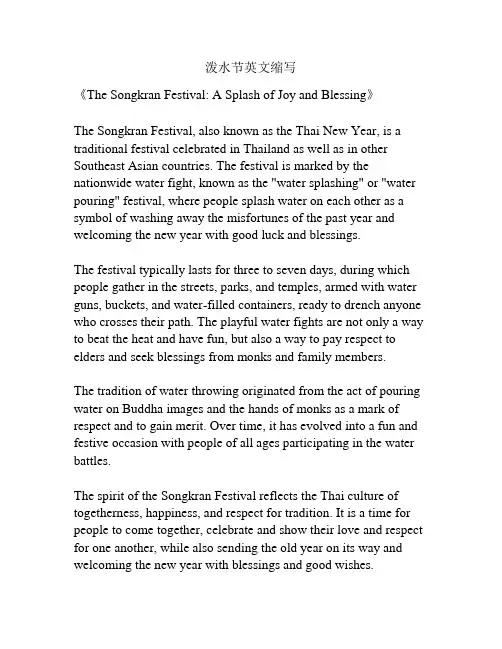
泼水节英文缩写《The Songkran Festival: A Splash of Joy and Blessing》The Songkran Festival, also known as the Thai New Year, is a traditional festival celebrated in Thailand as well as in other Southeast Asian countries. The festival is marked by the nationwide water fight, known as the "water splashing" or "water pouring" festival, where people splash water on each other as a symbol of washing away the misfortunes of the past year and welcoming the new year with good luck and blessings.The festival typically lasts for three to seven days, during which people gather in the streets, parks, and temples, armed with water guns, buckets, and water-filled containers, ready to drench anyone who crosses their path. The playful water fights are not only a way to beat the heat and have fun, but also a way to pay respect to elders and seek blessings from monks and family members.The tradition of water throwing originated from the act of pouring water on Buddha images and the hands of monks as a mark of respect and to gain merit. Over time, it has evolved into a fun and festive occasion with people of all ages participating in the water battles.The spirit of the Songkran Festival reflects the Thai culture of togetherness, happiness, and respect for tradition. It is a time for people to come together, celebrate and show their love and respect for one another, while also sending the old year on its way and welcoming the new year with blessings and good wishes.In recent years, the Songkran Festival has gained international attention and has become a major tourist attraction, drawing visitors from all over the world who are eager to experience the joy and exuberance of the water splashing festivities.The Songkran Festival, with its infectious energy and sense of camaraderie, is a celebration of the simple joys of life and the hope for a brighter future. It is a time to let loose, have fun, and embrace the spirit of renewal and rejuvenation. So, if you ever find yourself in Thailand during the Songkran Festival, be prepared to get drenched in water, but also be ready to experience a true sense of joy and blessings.。
初中泼水节英语The Water-Splashing Festival, also known as the Songkran Festival, is a traditional celebration that takes place primarily in Thailand and other parts of Southeast Asia. The festival is marked by the pouring of water over one another as a symbol of cleansing and purification, as well as a way to祈求good health, happiness, and prosperity in the coming year.During the Water-Splashing Festival, people gather in public places such as temples, parks, and streets, where they splash water at each other using buckets, water guns, and even hoses. This act is believed to wash away bad luck and sins from the previous year, leaving the participants refreshed and ready to embrace the new year with positive energy.In addition to water-splashing, the festival also involves other traditional activities such as offering flowers and incense to Buddha images, visiting temples, and participating in parades and cultural performances. The festival lasts for several days, and it is a time for families and friends to come together, have fun, and celebrate the joy of life.In English, the Water-Splashing Festival can also be referred to as the "Thai New Year" or the "Songkran Festival," and it is a popular tourist attraction in Thailand, attracting visitors from all over the world to experience the unique celebration.1。